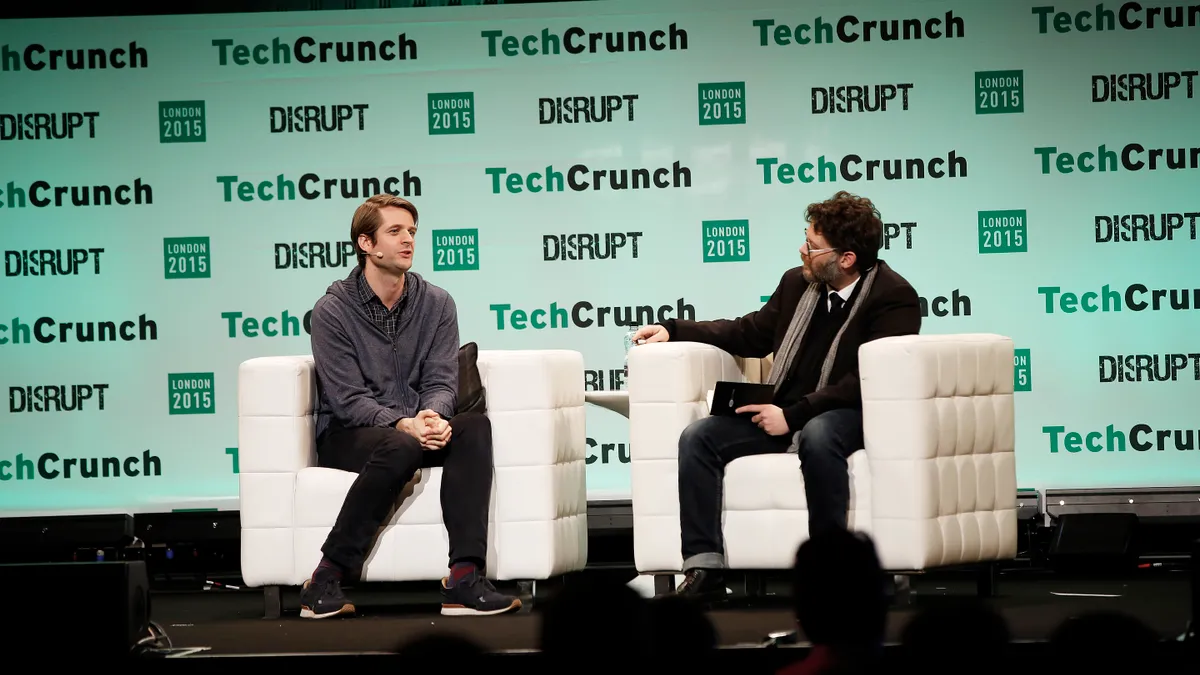Update: July 30, 2021: Venture capital directed to payments fintech companies during the second quarter also showed a record $8 billion invested, for a 25% increase over the first-quarter record, according to a report this month from CB Insights. That July 22 CB Insights report pointed out that e-commerce payments companies fighting fraud, including Forter and Signifyd, landed big rounds of funding during the quarter, $300 million and $205 million, respectively. The report also noted that virtual corporate card and expense management companies are gaining traction.
The momentum has continued this month with the digital card technology company Lithic announcing this week that it had raised $60 million and the invoicing and payments startup Lumanu saying it raised $12 million.
Dive Brief:
- Payments tech startups raked in a record $5.56 billion in venture capital worldwide for the first half of this year, according to a new report from S&P Global Market Intelligence’s commercial tech research arm. That was five times as much as the $1.1 billion raised in the first six months of last year for such payment service providers.
- Of the startups that raised money, it was the European fintechs that attracted the most capital, even though the support mainly came from both European and American investors. Swedish buy now-pay later company Klarna and Dutch e-commerce payments player Mollie got the biggest capital injections during the six-month period, hauling in about $1.6 billion and $791 million, respectively, according to the report from S&P’s 451 Research unit.
- Aside from big payments players, a lot of smaller companies are attracting money as well, said Jordan McKee, an S&P principal research analyst. Those lower-profile payments startups include London-based SaltPay; Sao Paulo-based CloudWalk and San Francisco-based Flutterwave, which raised $518 million, $190 million and $170 million, respectively. “There’s a lot of excitement around players that have flown a bit below the radar,” he said in an interview.
Dive Insight:
Venture capitalists have been throwing gobs of money at payments companies since the COVID-19 pandemic appeared last year and began fueling contactless e-commerce alternatives to in-person shopping and dining. Now, advanced digital payment methods are continuing to gain traction even as retailers and merchants bring the latest innovations to in-store payment systems.
The surge in e-commerce, plus more adoption by larger retailers and merchants, is driving the interest by venture capitalists, McKee said. In addition, those trends are spurring more competition, with new, lower-profile competitors arriving on the scene to grab a piece of the expanding e-commerce market, he added.
“Nine-figure (fundraising) rounds have pretty much become commonplace in this segment,” McKee said in an interview. There were 14 such rounds among the 19 that raised at least $20 million in the first half of the year (two companies, Klarna and contactless payments company SaltPay, raised more than that much twice during the period).
“We’re super proud to announce that we have raised one billion dollars from a lot of supportive investors that share our vision of (a) dream to create a better banking industry, one that really (will) have the customers’ best (interest) at heart,” Klarna CEO Sebastian Siemiatkowski said in a March 1 video discussing his company’s fundraising.
Only four of those 19 big rounds backed U.S. companies. They included the e-commerce facilitator Stripe, which has dual headquarters in San Francisco and Dublin; Flutterwave, which has targeted its payments services at international markets; San Diego-based online non-profit payments platform Classy; and Oakland, California-based government payments processor PromisePay.
European companies landed the most money, attracting more than 70 percent of the $5.56 billion. The regulatory landscape in Europe; the prevalence of the need for local payment services to support cross-border commerce; and overall market fragmentation all allow for more competitive differentiation in that region, the report said.
New European regulations, such as the revised payment services directive, created new banking and payments parameters that have prompted change, McKee said by email. “This has resulted in new opportunities for startups in areas such as fraud prevention and open banking,” he said.
U.S. companies participate
Smaller, lower-profile U.S. companies also attracting money include San Francisco-based payments player Finix; Durham, North Carolina-based payment orchestration company Spreedly; and San Francisco-based digital wallet enterprise Eco, which said Tuesday it had raised another $60 million just four months after taking in $26 million in March.
Fraud prevention and buy now-pay later are two of the rising trends within the payments sphere that are luring the most investments, McKee said. With respect to BNPL, it's in a “land grab” phase with payments upstarts racing to sign up retail and merchant partners, he said.
"More commerce shifting online has meant accelerated transaction volume and customer growth for market participants," the report said. "The shift to digital has also helped to bolster demand for PSPs' ancillary services, such as fraud prevention."
More of the same to come
All the money flowing to payments startups is likely to continue for the “foreseeable future,” and that will, in turn, precipitate mergers and acquisitions, McKee said. Stripe and London-based rival Checkout.com, both of which aid companies in accepting digital payments, are among those that bought businesses this year.
"We expect more PSPs to redeploy some (of) their fresh capital in the form of M&A, becoming increasingly active buyers of payments and commerce targets," the report said.
While U.S. payments startups may be benefiting less from the latest fundraising than their European counterparts, McKee notes that the growth is inherently international as cross-border transactions rise. “The global nature of the payments industry is something that’s going to continue to fuel growth and investor interest,” he said.











